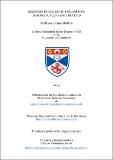Files in this item
Madness in Socratic philosophy : Xenophon, Plato and Epictetus
Item metadata
| dc.contributor.advisor | Long, Alex | |
| dc.contributor.author | Shelton, Matthew James | |
| dc.coverage.spatial | vi, 198 p. | en_US |
| dc.date.accessioned | 2019-04-04T11:52:16Z | |
| dc.date.available | 2019-04-04T11:52:16Z | |
| dc.date.issued | 2019-06-27 | |
| dc.identifier.uri | https://hdl.handle.net/10023/17447 | |
| dc.description.abstract | My central claim is that three Socratic philosophers, Xenophon, Plato and Epictetus, engage with views presented as non-philosophical in their discussions of madness, and this engagement, which has not been sufficiently treated by previous scholarship, plays a key role in each thinker’s distinct rhetorical strategy. Xenophon’s Socrates conserves a popular definition of madness in the Memorabilia, but adds his own account of what is similar to madness. Xenophon does not merely make Socrates transmit conventional views; instead, Socrates’ comparison allows Xenophon to take rhetorical advantage of popular attitudes while enlarging the apotreptic scope of madness. Socrates can use comparisons with madness to deal with a great many people, including his rivals, the natural scientists, and various interlocutors who, unlike the mad, can still benefit from his teaching. In the Phaedrus, Plato’s Socrates employs a concept of madness which, I argue, is applied without equivocation across both of his speeches in the first part of the dialogue. Importantly, Socrates’ inclusion of rational philosophy as a kind of madness is not presented as a distortion of this concept. The connections between madness, love and philosophy are drawn from non-philosophical material, in particular poetry and comedy, and Socrates engages with a popular caricature of the philosopher as eccentric or mad. Instead of rejecting the caricature, Socrates re-evaluates philosophical madness by explaining the transformation of the philosopher’s soul. Epictetus’ view of madness is less compromising, and this is to be expected considering the Stoic doctrine that all who are unwise are mad. Like earlier Stoics, however, Epictetus recognises a surprising range of non-Stoic distinctions within madness. Although he engages with these distinctions, he does so only to undermine them and to bring his audience round to the realisation that they are mad once their own views are applied consistently with respect to Stoic teaching. | en_US |
| dc.language.iso | en | en_US |
| dc.rights | Attribution-NonCommercial-NoDerivatives 4.0 International | * |
| dc.rights.uri | http://creativecommons.org/licenses/by-nc-nd/4.0/ | * |
| dc.subject | Madness | en_US |
| dc.subject | Mania | en_US |
| dc.subject | Socrates | en_US |
| dc.subject | Xenophon | en_US |
| dc.subject | Plato | en_US |
| dc.subject | Epictetus | en_US |
| dc.subject | Phaedrus | en_US |
| dc.subject | Memorabilia | en_US |
| dc.subject | Ancient philosophy | en_US |
| dc.subject | Socratic philosophy | en_US |
| dc.subject | Aristophanes | en_US |
| dc.subject | Mental illness | en_US |
| dc.subject | Collection and division | en_US |
| dc.subject | Sappho | en_US |
| dc.subject | Anacreon | en_US |
| dc.subject | Eros | en_US |
| dc.subject | Stoicism | en_US |
| dc.subject | Hallucination | en_US |
| dc.subject | Chrysippus | en_US |
| dc.subject | Posidonius | en_US |
| dc.subject | Divine possession | en_US |
| dc.subject.lcc | B335.S5 | |
| dc.subject.lcsh | Philosophy, Ancient | en |
| dc.subject.lcsh | Xenophon--Criticism and interpretation | en |
| dc.subject.lcsh | Plato--Criticism and interpretation | en |
| dc.subject.lcsh | Epictetus--Criticism and interpretation | en |
| dc.subject.lcsh | Mental illness--Philosophy | en |
| dc.title | Madness in Socratic philosophy : Xenophon, Plato and Epictetus | en_US |
| dc.type | Thesis | en_US |
| dc.contributor.sponsor | Professor Ian Kidd Bequest for Classics | en_US |
| dc.contributor.sponsor | University of St Andrews. St Leonard's College Scholarship | en_US |
| dc.contributor.sponsor | National Research Foundation (South Africa) | en_US |
| dc.contributor.sponsor | Oppenheimer Memorial Trust | en_US |
| dc.type.qualificationlevel | Doctoral | en_US |
| dc.type.qualificationname | PhD Doctor of Philosophy | en_US |
| dc.publisher.institution | The University of St Andrews | en_US |
| dc.identifier.doi | https://doi.org/10.17630/10023-17447 |
The following licence files are associated with this item:
This item appears in the following Collection(s)
Except where otherwise noted within the work, this item's licence for re-use is described as Attribution-NonCommercial-NoDerivatives 4.0 International
Items in the St Andrews Research Repository are protected by copyright, with all rights reserved, unless otherwise indicated.


